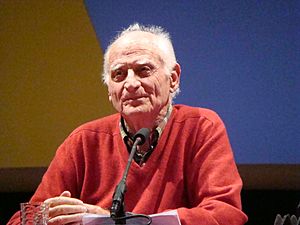Michel Serres facts for kids
Quick facts for kids
Michel Serres
|
|
|---|---|

Michel Serres in Rennes, February 2011
|
|
| Born | 1 September 1930 |
| Died | 1 June 2019 (aged 88) |
| Alma mater | École Navale École Normale Supérieure University of Paris |
| Era | Contemporary philosophy |
| Region | Western philosophy |
| School | Continental philosophy French epistemology |
| Institutions | University of Paris I Stanford University |
|
Main interests
|
Epistemology Philosophy of science |
|
Notable ideas
|
Hermes, the messenger of the gods, as standing for the communication that takes place between science and the arts |
|
Influences
|
|
|
Influenced
|
|
Michel Serres (born September 1, 1930 – died June 1, 2019) was a famous French philosopher, thinker, and writer. He wrote about many interesting topics like science, time, and even death. Later in his life, he also wrote stories and essays.
| Top - 0-9 A B C D E F G H I J K L M N O P Q R S T U V W X Y Z |
Michel Serres' Early Life and Education
Michel Serres was born in Agen, France. His father worked on a barge, which is a type of boat. In 1949, Michel joined France's naval academy, the École Navale. He then went to another important school, the École Normale Supérieure, in 1952.
He studied philosophy and finished his studies in 1955. After that, he worked as a naval officer for several years. In 1968, he earned his highest degree, a doctorate, from the University of Paris. He started teaching at the University of Paris I in 1969.
Childhood Experiences and Philosophy
When Michel Serres was a child, he saw a lot of war and destruction. These experiences deeply affected him. Because of this, he always tried to avoid ideas that were based on fighting or suspicion. He wanted to find ways of thinking that brought things together instead of tearing them apart.
Michel Serres' Ideas and Writings
For over twenty years, Serres became known as an amazing lecturer. People loved his talks. He also wrote beautiful and sometimes mysterious books. His writing style was so unique that it was hard to translate into other languages.
He wrote about many different subjects. These included the mythical Northwest Passage, which is a sea route. He also wrote about the idea of a parasite, which is something that lives off another. He even wrote about the sad explosion of the Space Shuttle Challenger.
Connecting Science and Other Fields
Michel Serres was very interested in the philosophy of science. He wanted to show that there isn't just one "right" way to understand science. Instead, he believed that different ideas and fields could "translate" between each other.
To explain this, he used the idea of Hermes. Hermes is a messenger god in Greek myths. Serres saw Hermes as a symbol for how science and art, or different areas of knowledge, can communicate. He thought of Hermes as someone who helps ideas travel back and forth between different subjects.
Later Life and Recognition
In 1990, Michel Serres was chosen to join the Académie française. This is a very special honor in France. It showed that he was one of the country's most important thinkers. He also taught French at Stanford University in the United States.
One of his most famous books is Le contrat naturel (The Natural Contract), written in 1990. In this book, he talked about how important it is for philosophy to deal with the climate crisis. He wrote about this topic long before it became a major global concern.
Thoughts on the Digital Age
Michel Serres was very interested in how the world was changing with computers and the internet. He believed that new rules and ways of thinking would come from the digital world. He thought the internet, which seemed to have no rules at first, would lead to a completely new kind of law.
He was also a big fan of freely available knowledge. He especially liked Wikipedia, where everyone can learn and share information.
Awards and Legacy
Michel Serres received several important awards. In 2012, he won the Meister Eckhart Prize. The next year, in 2013, he was given the Dan David Prize. He passed away on June 1, 2019, when he was 88 years old. His ideas continue to influence many thinkers today.
See also
 In Spanish: Michel Serres para niños
In Spanish: Michel Serres para niños
 | Dorothy Vaughan |
 | Charles Henry Turner |
 | Hildrus Poindexter |
 | Henry Cecil McBay |

